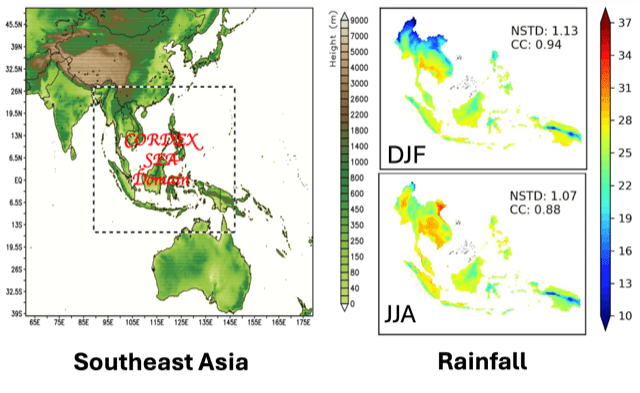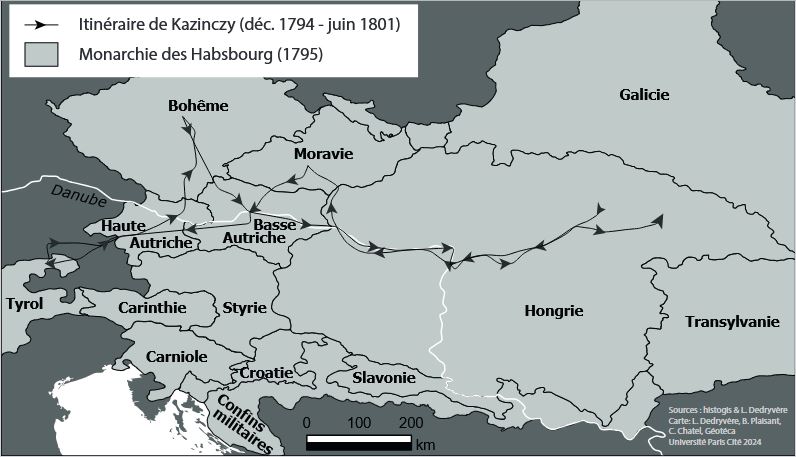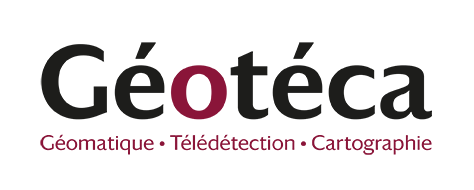In my presentation, I will firstly introduce about the University of Science and Technology of Hanoi (USTH, also called Vietnam-France University). USTH is a public university, established in 2009 under the Intergovernmental Agreement between Vietnam and France with the aims to be a leading research-oriented university at an international standard in Vietnam.

Next, I will provide an overview of meteorological hazards and climate change modeling activities in Southeast Asia, along with recent downscaling activities using the Coupled Model Intercomparison Project Phase 5 (CMIP5) and Phase 6 (CMIP6). Southeast Asia is currently home to 8.6% of the world’s population, and any changes in the climate system can significantly impact the region’s socio-economic structures and living conditions. Given the high exposure and vulnerability of the region to extreme events, countries in Southeast Asia need to implement adaptation measures to mitigate risks. Therefore, there is a critical need for detailed information on future climate scenarios in the region. However, such information is still lacking in the region and often derived from global climate models (GCMs) that may have large uncertainties in a complex area like Southeast Asia. In order to fill the gap, the Coordinated Regional Climate Downscaling EXperiment – Southeast Asia (CORDEX-SEA) project was established and successfully brought together members from several countries to carry out a high-resolution, multi-model regional climate downscaling experiment. Additionally, several statistical downscaling efforts have been conducted. We address how the simulation of present-day extremes is influenced by various choices in physical parameterizations, aiming to identify schemes well-suited for simulating the climate in the region. Subsequently, we analyze the future projected mean climate and extreme conditions in Southeast Asia.
Lastly, I will elaborate on some ideas for potential collaboration opportunities in both training and research topics.
Dr. Thanh Ngo-Duc received his engineering diploma and Master degree from the Ecole Polytechnique (France) in 2001 and 2002, respectively. He obtained his Ph.D. in Meteorology from University of Paris VI in 2005. His Ph.D. thesis was awarded the silver medal of the Academy of Agriculture of France, and the Nathalie DEMASSIEUX prize of the Chancellery of the Universities of Paris in 2006.
Dr. Thanh Ngo-Duc is currently Co-Director of the Department of Space and Applications (DSA), and Co-Director of the LOTUS International Joint Laboratory (http://lotus.usth.edu.vn) at the University of Science and Technology of Hanoi (USTH).
He is currently the Chairman of the Scientific Committee in Earth and Environmental Sciences of the Vietnam National Foundation for Science and Technology Development (NAFOSTED).
He is the lead author of the Sixth Assessment Report (AR6) of IPCC (2021).
Using modeling and remote sensing tools, his research focuses on the topics of natural disasters and climate change. He has been responsible for the climate work package of the project GEMMES Vietnam funded by AFD (2018-present).
Contact: Thanh NGO-DUC, Assoc. Prof.
Co-Director, Department of Space and Applications,
University of Science and Technology of Hanoi,
Vietnam Academy of Science and Technology
18 Hoang Quoc Viet, Cau Giay, Hanoi, Vietnam
Email: ngo-duc.thanh@usth.edu.vn
Google scholar: https://scholar.google.com/citations?user=RivfmqAAAAAJ
6 mars 2024 – 13h
À lire aussi

FORMATION 2025 Les bases de la GEOMATIQUE – 7-8 avril 2025
Cette formation s'adresse à tout type de public ayant des données à cartographier et qui souhaite se familiariser avec un logiciel de Système d'Information Géographique (logiciel de cartographie). Objectifs => Savoir manipuler des données dans un logiciel de...

Prochaine formation : Réaliser une carte et s’initier au SIG (système d’information géographique) avec le logiciel Q Gis
Quand : mardi 11/02/2025 et vendredi 14/02/2025, de 9h30 à 12h30 et de 14h à 17h Responsables : Cathy CHATEL et Brian PLAISANT, Ingénieurs en géographie et bases de données, Plateforme de recherche Geoteca, UFR GHES Public concerné : Etudiants tous niveaux,...

Biogéographie urbaine : Approche multiscalaire des facteurs structurants la biodiversité des villes – Clément Gros – jeudi 13 février 13h-14h
Cette présentation est un panorama de mes travaux de recherche. Ce travail a pour objectif de caractériser les facteurs écologiques propres aux systèmes urbains et leurs effets sur la structuration des communautés végétales et de papillons de jour. © Clément Gros Plus...

Ferenc Kazinczy et son Journal de captivité: cartographie de la détention politique dans la monarchie des Habsbourg pendant les guerres contre la France révolutionnaire (1794-1801) – Laurent Dedryvere – jeudi 30 janvier 13h
Présentation du Journal de ma captivité de Ferenc Kazinczy, à l’occasion de la parution de sa traduction aux éditions Pétra (2024). Traduction du hongrois, de l’allemand et du latin, introduction et notes par Laurent Dedryvere (traduction relue par ildikó Lőrinszky)....
